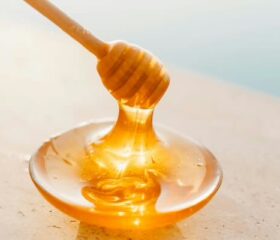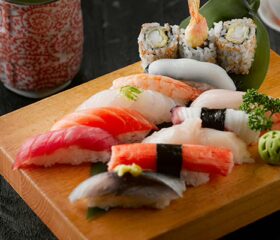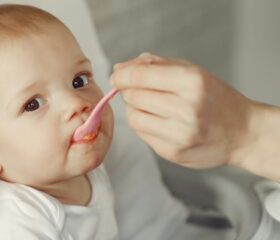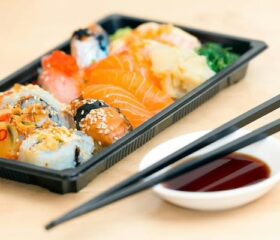Can Pregnant Women Eat Honey?
If you’ve heard that infants can’t eat honey, that may make you hesitant to add it to your afternoon tea or breakfast waffles when you’re pregnant.

It’s smart to be cautious about avoiding certain foods while you’re pregnant. Doing so will protect you and your little one from potential illnesses and pregnancy complications.
So, is honey also on that no-go list, or can you include it in your pregnancy diet?
In this article, we’ll answer that question, explore why only adults and older children can have honey, and go over some of the dos and don’ts when you eat it (whether you’re pregnant or not).
Is it safe to eat honey while pregnant?
We’ll cut to the chase: yes, it’s safe to eat honey (both pasteurized and unpasteurized) while you’re pregnant, as well as when you’re breastfeeding.
This answer might seem counterintuitive given that it’s well-known that you shouldn’t feed honey to children under 12 months old. 1 It’s true that honey can be dangerous for babies, but that’s only when they consume it directly; the risks don’t reach them in the womb when you (as an expecting mom-to-be) consume it yourself.
Why can’t babies under a year old eat honey?
Babies under a year old can get sick if they eat honey, even if it’s pasteurized, because it sometimes contains harmful bacteria called Clostridium botulinum.
These bacteria form spores (protective cells). In certain conditions, those may “activate,” growing and producing a toxin that can lead to a serious illness called botulism, which causes symptoms like: 2
- Weakness
- Difficulty breathing and swallowing
- Digestive issues and abdominal cramps
- Nausea and vomiting
- Double vision
Healthy adults and older children typically have no issues eating honey with botulinum spores, and even if you somehow get infected while you’re pregnant or breastfeeding, it’s unlikely you’ll transmit the disease to your baby. 3 4 5
However, for unknown reasons, those spores often activate in the intestines of infants under a year old, leading to botulism. 6
Again, this means that honey is safe for you to include in your pregnancy diet, but once you give birth, hold off on feeding it to your baby for at least 12 months.
Raw vs. pasteurized honey: is there a difference?
Pasteurizing honey involves exposing it to high heat. Unlike with many other products (e.g., milk and cheese), which are pasteurized to make them safe for consumption, the main reason for pasteurizing honey is to extend its shelf life rather than kill harmful germs. 7 8
Not all honey is pasteurized. Sometimes, people harvest and filter raw (unpasteurized) honey without exposing it to heat. 7 Many people prefer the taste of raw honey, and some also believe that it’s more nutritious than pasteurized honey (although that hasn’t been conclusively proven). 9
As a pregnant mom, you don’t really need to worry about whether your honey is pasteurized or unpasteurized. There’s no difference when it comes to how safe it is to consume.
Both types of honey are safe for healthy pregnant women and unsafe for children under one.
How much honey can you eat while pregnant?
Although honey won’t hurt your baby, you should still enjoy it in moderation when you’re pregnant (and, for that matter, at other times). That isn’t because there’s anything particularly dangerous in it—it’s just very sweet.
Although honey is healthier than white sugar, the US Food and Drug Administration (FDA) still considers it a form of “added sugar,” along with other sweeteners and syrups. 10 As you probably know, consuming too much sugar isn’t good for your health, and can lead to illnesses like obesity, diabetes, and heart disease. 11
The FDA suggests you limit your added sugar intake to less than 10% of your total calories. 11 According to the Centers for Disease Control (CDC), 100 calories of added sugar is equivalent to about 6 teaspoons.
Refer to the following chart for an estimate of what your daily calorie intake should be in each trimester of pregnancy and how much added sugar (e.g., honey) that means you can have. 12 Note that these figures are rough averages, and you should consult with your doctor for a more precise plan.
Ideal Total Calorie and Honey Intake During Pregnancy
| Trimester of pregnancy | Total calorie intake per day | Honey intake per day |
|---|---|---|
| First trimester | 1,800 calories | 11 teaspoons of honey |
| Second trimester | 2,200 calories | 13 teaspoons of honey |
| Third trimester | 2,400 calories | 14 teaspoons of honey |
To be clear, those honey intake amounts are thresholds that you shouldn’t exceed—not goals you should aim for each day.
Also, again, the total calorie intake amounts listed above are estimates. Talk with your doctor about how many you should actually consume.
Some women should be more cautious about honey
You should be extra cautious about your honey (and other sugar) intake if you have diabetes. 13 Additionally, you may be more likely to get botulism if you’ve recently undergone antibiotic treatment or have gastrointestinal issues. 3 14 15 If you check any of those boxes, talk to your doctor about whether you can eat honey.
How to choose and store honey safely
When you buy honey, check the product’s label to see if it’s raw or pasteurized (if you have a preference—both are safe while you’re pregnant). More importantly, look to see if it contains added sweeteners like corn syrup, which you should avoid if possible.
Honey doesn’t have an expiration date. It typically won’t spoil as long as you keep it in an airtight container in a cool, dark place. 16 That said, if it smells weird, grows mold, or has other indicators that make you suspect it’s spoiled, don’t hesitate to throw it away.
Are there any health benefits to eating honey while pregnant?
Unfortunately, there aren’t any proven health benefits to eating honey while you’re pregnant (or at other times). Some researchers think it may potentially help with digestion, ease coughs, and protect against bacteria, but they’re still studying those benefits. 17 18
Honey contains certain nutrients (vitamins, minerals, and natural antioxidants). However, it’s also very sweet and calorically dense. While its nutritional profile is better than white sugar, it’s best as an occasional treat, not a major component of your diet. 10 19
Final thoughts
As long as you don’t have diabetes or any other health conditions that mean you should avoid sweets, it’s fine to enjoy honey in moderation while you’re pregnant and breastfeeding. Feel free to add it to your tea or drizzle it on plain yogurt (the latter makes a reasonably healthy pregnancy snack).
Just remember to wait until your child’s first birthday to introduce her to this smooth and sweet delicacy.
Article Sources
- Centers for Disease Control and Prevention. "Foods and Drinks to Avoid or Limit" Retrieved August 29, 2025.
- MedlinePlus. "Botulism" Retrieved August 29, 2025.
- Canadian Family Physician. "Food-borne illnesses during pregnancy" Retrieved August 29, 2025.
- California Department of Public Health. "Frequently Asked Questions (FAQs) About Infant Botulism" Retrieved August 29, 2025.
- Clinical Infectious Diseases. "Botulism During Pregnancy and the Postpartum Period: A Systematic Review" Retrieved August 29, 2025.
- Centers for Disease Control and Prevention. "About Botulism" Retrieved August 29, 2025.
- Michigan State University Extension. "The sweetness of honey" Retrieved August 29, 2025.
- Centers for Disease Control and Prevention. "Raw Milk" Retrieved August 29, 2025.
- MedicalNewsToday. "Raw honey vs. regular honey" Retrieved August 29, 2025.
- UMass Chan Medical School. "The Sweet Truth of Honey" Retrieved August 29, 2025.
- Centers for Disease Control and Prevention. "Get the Facts: Added Sugars" Retrieved August 29, 2025.
- MedlinePlus. "Eating right during pregnancy" Retrieved August 29, 2025.
- MedlinePlus. "Diabetic Diet" Retrieved August 29, 2025.
- Centers for Disease Control and Prevention. "Botulism Prevention" Retrieved August 29, 2025.
- Merck Manual. "Botulism" Retrieved August 29, 2025.
- Mississippi State University Extension. "Does Honey Go Bad?" Retrieved August 29, 2025.
- U.S. Department of Agriculture. "Honey’s Sweet Benefits" Retrieved August 29, 2025.
- MedlinePlus. "Herbs and Supplements" Retrieved August 29, 2025.
- Tufts University Health & Nutrition Letter. "Honey: Potential Benefits and Risks" Retrieved August 29, 2025.







